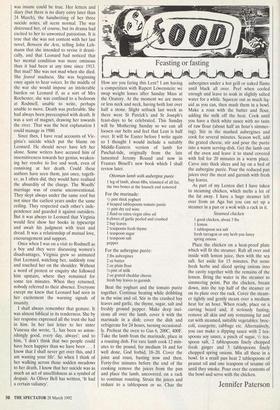Long life
An act of unselfishness
Nigel Nicolson On every 28 March I think of Virginia Woolf, why she drowned herself in the Sus- sex Ouse on that day in 1941 and why she chose that horrifying method. Imagine her half-mile walk from her house to the river and how she stuffed a big stone into the pocket of her overcoat, laid her walking- stick on the bank (as a marker, I suppose), threw herself into the cold water, struggled not to swim, and sank. All this time she had at home the lethal dose of morphia which Leonard had provided for both of them in case the Germans landed at Newhaven, only three miles away.
As I edited the last volume of her letters and read what she had written almost gaily to her frieads, planning future meetings to mislead them, all the while knowing what she intended, having indeed tried unsuc- cessfully to drown herself in a dyke ten days before her actual suicide, I wondered whether the coroner's explanation that she
was insane could be true. Her letters and diary (but there is no diary entry later than 24 March), the handwriting of her three suicide notes, all seem normal. The war distressed her, of course, but its drama had excited to her to unwonted patriotism. It is true that she was not content with her last novel, Between the Acts, telling John Leh- mann that she intended to revise it drasti- cally, and that Leonard had noticed that her mental condition was more ominous than it had been at any time since 1913. But mad? She was not mad when she died. She feared madness. She was beginning once again to hear voices. In the middle of the war she would impose an intolerable burden on Leonard if, as a sort of Mrs Rochester, she was confined to a bedroom at Rodmell, unable to write, perhaps unable to move. Death was preferable. She had always been preoccupied with death. It was a sort of magnet, drawing her towards the river. That was the best explanation I could manage in 1980.
Since then, I have read accounts of Vir- ginia's suicide which put the blame on Leonard. He should never have left her alone. Some writers have accused him of insensitiveness towards her genius, weaken- ing her resolve to live and work, even of conniving at her death. Could these authors have seen them, just once, togeth- er, as I often did, they would have realised the absurdity of the charge. The WooIfs' marriage was of course unconventional. They slept always under the same roof but not since the earliest years under the same ceiling. They respected each other's inde- pendence and guarded it against outsiders. But it was always to Leonard that Virginia would first show her books in typescript and await his judgment with trust and dread. It was a relationship of mutual love, encouragement and support.
Once when I was on a visit to Rodmell as a boy and they were discussing women's disadvantages, Virginia grew so animated that Leonard, watching her, suddenly rose and touched her on the shoulder. Without a word of protest or enquiry she followed him upstairs, where they remained for . some ten minutes. When they returned, nobody referred to their absence. Everyone except me knew that Leonard had seen in her excitement the warning signals of insanity.
I shall always remember that gesture. It was almost biblical in its tenderness. She by her response expressed all the trust she had in him. In her last letter to her sister Vanessa she wrote, 'L. has been so aston- ishingly good, every day, always': and to him, 'I don't think that two people could have been happier than we have been . . . I know that I shall never get over this, and I am wasting your life'. So when I think of her walking across those sodden meadows
to her death, I know that her suicide was as much an act of unselfishness as a symbol of despair. As Oliver Bell has written, 'It had a certain valiancy'.



























































 Previous page
Previous page